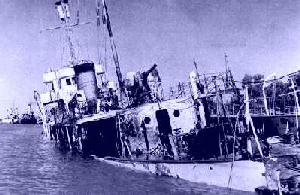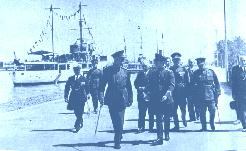US threatens sanctions on China banks over Iran
-
BEIJING - A top US envoy said Wednesday that Washington could penalise China's four biggest state banks if they were found doing business with an Iranian insurance firm in violation of US nuclear sanctions.
David Cohen, US Treasury's under-secretary for terrorism and financial intelligence, was in China to discuss measures to prevent Iran from obtaining financing for its nuclear weapons programme and means to spread its hardware.
His China trip followed a stop in Hong Kong, where he met with representatives of the four banks -- Bank of China, China Construction Bank, Industrial and Commercial Bank of China and the Agricultural Bank of China.
Speaking to journalists Wednesday, Cohen said he told the banks that if they accepted payment from Moallem, an Iranian insurer, they could be cut off from the US financial system under a 2010 US law promoting tighter sanctions on Iran.
Moallem insures Iran’s national bulk container carrier, the Islamic Republic of Iran Shipping Lines (IRISL), a company with three subsidiaries, in violation of United Nations Security Council resolutions.
Both Moallem and IRISL have been designated as violators of anti-nuclear proliferation rules set by the United States and the European Union.
Many European countries no longer do business with IRISL and have closed their ports to its ships, but the vessels still make calls in Asia, Cohen said.
In January, the US Treasury identified several Hong Kong-based shipping companies as having strong links with IRISL.
Cohen also met with 20 financial institutions, local port authorities and shipping companies in Hong Kong to encourage them not to deal with IRISL or Mohallem.
"Any foreign bank that receives payment from Moallem on behalf of a client risks losing its ability to do business in the United States," he said.
In Beijing, meanwhile, Cohen held talks with officials from China's Ministry of Finance, Ministry of Foreign Affairs and ruling Communist Party in two days of meetings.
Hong Lei, a spokesman for China's foreign ministry, said Wednesday none of China's business with Iran violated UN resolutions.
"As a permanent member of the Security Council, China always implements UN Security Council resolutions," he said.
The United States and other world powers accuse Iran of seeking to acquire a nuclear weapons capacity under the guise of its civilian atomic work, a charge Tehran strongly denies.
Iran is under five sets of UN Security Council sanctions, as well as US ones, over its nuclear programme.
- AFP/ir -
am i the only one who has the impression this world belongs to US and his allies?
anything or anyone US doesnt like is an outlaw?
US can produce nuclear bombs but others cannot?
-
But Iran's behaviour is nowhere better either...
Twist n turn WWII history
-

The Iranian
From "Sunrise at Abadan: The British and Soviet Invasion of Iran, 1941" by Richard A. Stewart, Major U.S. Marine Corps. (Praeger, New York,1988). In memory of Admiral Bayandor and the many valiant Iranian navymen, airmen and soldiers who died in the 1941 surprise attack. And with thanks to Farhad Sepahbody.
As the first glimmer of dawn lit the misty horizon on the morning of August 25, 1941, the HMS Shoreham trained her forward gun battery on the Iranian warship Palang, which was moored peacefully at an Abadan pier. A moment later, a shell slammed into the Palang, the explosion engulfing the vessel in a ball of fire and smoke. As the listing warship settled into the river mud, British and Soviet armies stormed across Iran's borders - commencing perhaps the most dramatic and controversial untold episode of World War II.

The Iranian Sloop Babr (Cougar) after being shelled
by the British Navy in Iran's "Day of Infamy."Attacked without provocation, neutral Iran suffered her own "Pearl Harbor" three months prior to the United States' more famous Day of Infamy. Iran's army was crushed, her monarch was overthrown, the beleaguered Red Army was saved from defeat, a German conquest of the Persian Gulf oil fields was thwarted, and the conditions were created for the opening showdown of the Cold War.
Few incidents of World War II relate more directly to the current crisis in the Persian Gulf than those described in this book.Sunrise at Abadan explains how -- more by accident than design -- the Anglo-Soviet invasion drew the United States deeply and inextricably into the affairs of Iran.
Sunrise at Abadan is intended as a scholarly rendition and analysis of these events and the attendant moral issues. In addition, the compelling political and human drama of this episode requires some portrayal to understand its moral significance.

Reza Shah (front with cane) reviews newly created fleet
accompanied by Admiral Bayandor with white cap (left)Churchill viewed the issue as a simple choice: thwarting Nazi world conquest versus scrupulously observing international convention. The Prime Minister knew that he would require at least the tacit approval of President Franklin D. Roosevelt before attacking Iran. Roosevelt could have invoked U.S. moral authority and economic power to avert the Allied invasion.
But instead, his administration stood by passively, brushing aside desperate Iranian pleas until it was too late. Moreover, Roosevelt even secretly approved the plans against Iran, only to later publicly deny any knowledge of British intentions.
Sunrise at Abadan: The British and Soviet Invasion of Iran, 1941
http://www.amazon.com/Sunrise-Abadan-British-Soviet-Invasion/dp/0275927938
-
Funny for a broken power to make so much noise to its creditor.
They not scared one day china become pissed off and decide to dump all of their US treasury bonds and Euro bonds. Then I shall see whether they still care about whether china observes UN sanctions or not.
-
US can sell arms to israel. but china cannot deal with iran?
US can produce nuclear weapons but other countries cannot? so full of shit. if US really mean it all the nuclear powers should disarm all their nuclear weapons once and for all.
-
China raps Myanmar over dam project
BEIJING: Beijing has urged Myanmar to protect the rights of Chinese companies after the government halted construction of a $3.6 billion China-backed mega dam following public opposition to the project.
Myanmar President Thein Sein on Friday ordered work on the Myitsone Dam on the Irrawaddy River to stop -- a decision hailed by the United States as a sign the military-backed leadership was listening to its people.
Chinese foreign ministry spokesman Hong Lei on Saturday urged "relevant countries to guarantee the lawful and legitimate rights and interests of Chinese companies".
"The Myitsone power station is a jointly invested project between China and Myanmar" and it has been "rigorously examined by both sides", Hong said in a statement.
Hong called for both sides to "properly handle" the matter through "friendly consultations".
Beijing and the Myanmar government have a close relationship and the comments are a rare public display of discord between them.
The dam in the northern state of Kachin was backed by energy giant China Power Investment Corp.
Environmentalists warn the dam project would inundate an area about the size of Singapore, submerging dozens of villages, displacing at least 10,000 people and irreversibly damaging one of the world's most biodiverse areas.
Friday's announcement marked an unexpected U-turn by the Myanmar regime. Local media had quoted the minister for electric power as saying earlier in September that construction of the dam would go ahead despite public concerns.
For the people of Kachin, the Myitsone dam has come to symbolise the struggles they have faced for decades as a marginalised ethnic group in the repressed nation under almost half a century of military rule.
Activists urged China Power Investment to remove workers and equipment from the site and to allow local villagers who were forced to relocate to go home.
- AFP/cc=============================
do the american govt listen to its people?